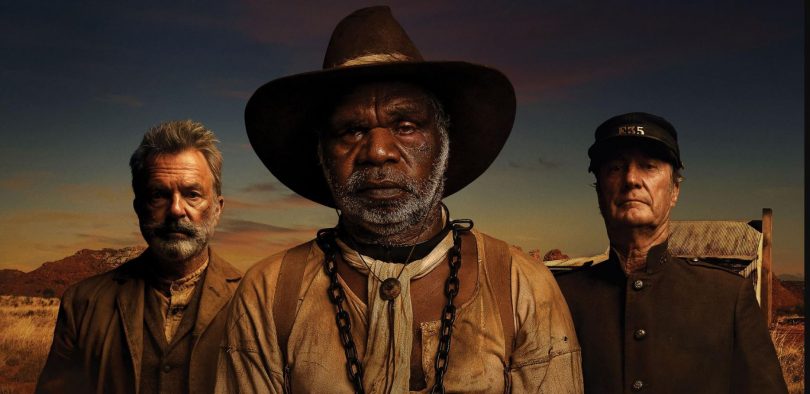
Despite altogether disappearing from Dendy Canberra for reasons unknown, Sweet Country is still screening at Palace Cinemas and Event Cinemas Manuka. Australian films need all the screenings they can get and, having been awarded the Special Jury Prize at the Venice Film Festival, this one merits your attention.
With the recent Week of Warwick over at the NFSA, Thornton further raises the profile of Aboriginality on film in line with his previous work: Samson & Delilah (2009), The Darkside (2013) and We Don’t Need A Map (2017). With its pointed title, Sweet Country paints a picture of a beautiful country with a bittersweet history. When I say paint, I very much mean paint. Almost a decade on from shooting to stardom with his debut, Thornton here delivers an elegiac ode to Aboriginal Australia in an artful and painterly love letter to cinema and country.
Based around the purported true story of an indigenous man who murdered a white man in self-defence in 1920s Northern Territory and the events which unfolded thereafter, Thornton again serves as writer, director and cinematographer to mount this piece of lyrical beauty. Irrespective of whether the entire production is completely, unfailingly accurate – no ‘true story’ ever entirely is – does not render it is any less credible. Unfortunately, the behaviour and attitudes displayed hardly beggar belief.
Recruiting the recognisable faces of Bryan Brown (Australia Day, Beautiful Kate, Two Hands) Sam Neill (Hunt For the Wilderpeople, Jurassic Park, The Piano), and Matt Day (Rake), Thornton introduces indigenous actor Hamilton Morris as our imperilled and sympathetic protagonist, Sam Kelly – the outlaw connotation of his surname seemingly deliberate. Metaphorically, much of the film happens around him, with that which directly affects him being beyond his complete control. With relatively little dialogue of his own and by no means appearing in every scene, Morris’ body language and demeanour, his dejection and resignation, consistently speak volumes.
Sweet Country expresses itself most through images. The landscapes are breath-taking and Thornton’s cinematography is sublime. While authentic in its use of various indigenous languages, the noticeably recurrent use of the f-bomb amongst the stockmen did make me wonder how prevalent this was in 1920s Australia. Slightly distracting verbal profanity aside, it is Thornton’s framing of landscapes which really elevates this film. None of the performances are poor, but the scenery is staggering. The film excels most in what it doesn’t explicitly say, and the imagery (of the land) speaks to its audience in the way the land itself speaks to the indigenous people of Australia.
Channelling Rolf de Heer’s The Tracker (2002) and Fred Schepisi’s The Chant of Jimmie Blacksmith (1978) among other frontier/period/revisionist westerns, Sweet Country calls to mind various Australian productions where our iconic landscape is a character unto itself: The Proposition (2005), The Rover (2014), Wake In Fright (1971) and Mad Max (1979). Clearly a student of cinema, Thornton is one of few Indigenous Australians to achieve significant success behind the camera to date. Nevertheless, Australian cinema remains intrinsically linked with indigenous Australia through Charles Chauvel’s Jedda (1955) which was the first ever colour film produced in this country. Depicting a screening of what is considered to be the first feature-length film ever made, The Story of the Kelly Gang (1906), Thornton here tips his hat to the history of Australia and cinema alike.
Thornton portrays the unilateral oppression inflicted upon Indigenous Australians but highlights the violence sadly endemic to humanity by alluding to conflict between Aboriginal nations. Set after WWI, there is also an implicit commentary on the trauma suffered by soldiers and acknowledgement of the then insufficiently recognised nuances of shellshock and PTSD, and the accompanying self-medication and violence. The inclusion of early Chinese migrants also reflects our multicultural past. Thornton’s contemplative and affecting piece does well to convey not only frontiers of land but also frontiers between people, whether natural (skin colour), created (laws, creed, culture), or socio-political (racism). With effectively no soundtrack so as to reflect the inherent quiet in unforgiving vastness, Sweet Country is a pensive and ponderous piece which rails against the usurpation of land, culture and difference; especially when for the purposes of ethnic division. It also reiterates the superior value of a justice system – even at its imperfect best – over vigilantism.
With few moments of levity – Sam Neill provides a ribald religious reprieve – Sweet Country is an expectedly sombre and melancholic film. Part chase adventure, part old-world kangaroo-court legal drama, part love letter to country and Australia’s beautiful bucolic interior; this is yet another completely worthwhile entry into the Australian cinema canon exploring the desolation of land and soul. While the events leave much to be desired, the story provides much to take away.
4/5 watermelons.












